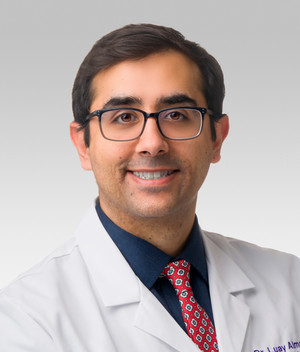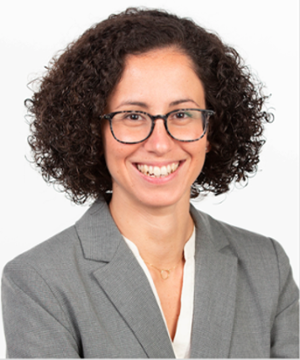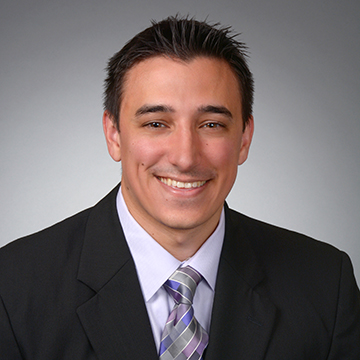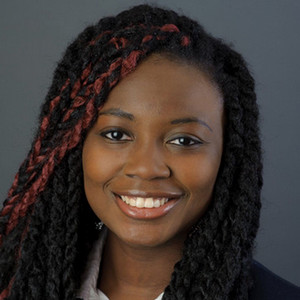Starzl Scholar Award
The Starzl Scholar Award provides fellowship salary support as part of our Pre-K program. We hope that through this program, our physician-scientist trainees will be able to advance their research to be competitive for a K award.
2024 Recipients

Luay Almassalha, MD, PhD
Luay Almassalha, MD, PhD is a fifth-year fellow in the Department of Gastroenterology and Hepatology at the Northwestern Feinberg School of Medicine. He is working toward his goal of becoming an independent physician-scientist running a lab at the intersection of mathematics, chromatin biology, and nanoscopic imaging to address gaps in the knowledge of disease of the gastrointestinal tract.
After receiving his MD and PhD training, through the Northwestern University Medical-Scientist Training Program under the mentorship of Dr. Vadim Backman and Dr. Igal Szleifer, Luay pursued clinical training in Internal Medicine and is currently completing his training in Gastroenterology and Hepatology. Motivated by his clinical experience with patients impacted by Eosinophilic Esophagitis and immune disorders throughout the gastrointestinal tract, Luay aims to study how the physical folding of the genome is transformed in these disorders and develop new therapeutics for patients with refractory inflammation. As a trainee of the Starzl Academy, Luay will continue to develop insights into the mechanisms involved in Eosinophilic Esophagitis and other auto-immune disorders.
Adenike Adewuyi, MD, PhD
Adenike Adewuyi, MD, PhD is a physician-scientist at the Shirley Ryan AbilityLab and Assistant Professor in the departments of Physical Medicine and Rehabilitation at Northwestern University Feinberg School of Medicine. Dr. Adewuyi received her bachelor’s degree in engineering sciences from Harvard University. Following her undergraduate studies, she completed the Medical Scientist Training Program at Northwestern University, earning her MD from the Feinberg School of Medicine and PhD in Biomedical Engineering from the McCormick School of Engineering. Her doctoral research focused on pattern recognition-based control of myoelectric partial-hand prostheses. She completed her residency in Physical Medicine and Rehabilitation and fellowship in neuromuscular medicine at the McGaw Medical Center of Northwestern University.
Dr. Adewuyi’s career goal is to run a translation research laboratory focused on human motor unit physiology and developing robust clinically applicable tools to characterize the peripheral motor system while caring for patients with nerve injuries and neuromuscular disease as a neuromuscular physiatrist and electrodiagnostician. Her current research investigates the degeneration of lower motor neurons following spinal cord injury. Dr. Adewuyi’s preliminary work has shown a high degree of lower motor neuron loss after injury to the spinal cord even below where the spinal cord is injured. This has significant implications for the success of interventional strategies such as reconstructive surgery, diaphragmatic pacing, and neuromodulation that have the potential to restore function. Dr. Adewuyi aims to understand the characteristics and mechanisms underlying this degeneration as this is a critical first step towards innovative therapeutic interventions that could improve patient care.
With the support of the Starzl Academy, during the upcoming years she is excited to continue exploring peripheral neuromuscular system changes after spinal cord injury and developing strategies to transform clinical management and improve patient outcomes.
2023 Recipient
Mariana Hernández González-Monje MD, PhD

Mariana Hernández González-Monje MD, PhD, is a postdoctoral scholar in the Department of Neurology at Northwestern University Feinberg School of Medicine and a Movement Disorders fellow.
Mariana received her medical degree at Universidad Autónoma de Madrid, Spain, and completed her residency in Neurology at the Hospital Universitario Clínico San Carlos, Madrid, Spain. She was awarded her PhD in Neuroscience in 2020 at Universidad Autonomous of Madrid, studying the dopaminergic innervation of the thalamus in an experimental non-human primate model of Parkinson's disease. Shortly after, she joined Northwestern University to expand her body of research and receive cell biology training in Dr Krainc's lab, where she is conducting her research.
With the support of the Starzl Academy, during the upcoming years, Mariana is excited to undertake a very creative project focused on a form of Parkinson’s disease caused by mutations that regulate dopamine synthesis. This particular genetic disorder offers an opportunity to more directly establish the role of dopamine metabolism in Parkinson’s disease, as opposed to other previously studied mechanisms. Additionally, due to the implication of dopamine metabolism in DOPA-responsive dystonia, the study will open new venues to researching the role of dopamine in basal ganglia circuitry dysfunction.
2022 Recipient
Timothy Luigino Sita, MD, PhD
 Timothy Luigino Sita, MD, PhD, is a fifth-year chief resident in the Department of Radiation Oncology at Northwestern Feinberg School of Medicine. Sita's career goal is to run a basic science laboratory focused on understanding the biology of brain tumors while treating patients as a clinical radiation oncologist. This dream is inspired by his grandfather and fueled by the many patients whom he has had the pleasure of meeting.
Timothy Luigino Sita, MD, PhD, is a fifth-year chief resident in the Department of Radiation Oncology at Northwestern Feinberg School of Medicine. Sita's career goal is to run a basic science laboratory focused on understanding the biology of brain tumors while treating patients as a clinical radiation oncologist. This dream is inspired by his grandfather and fueled by the many patients whom he has had the pleasure of meeting.
Sita's research focuses on understanding how brain tumors hijack normal brain’s activity to drive their own tumor growth. Recent discoveries have shown that brain tumors deeply integrate with normal neurons. These tumors form electrical network connections with neurons that allow them to both provoke and exploit excitatory messages, promoting tumor dissemination throughout the brain.
How to stop this integration between brain tumors and neurons is what Sita hopes to study in his lab. One promising idea is the repurposing of electroconvulsive therapy (ECT), the therapeutic induction of seizure, as a mechanism to disable tumor-neuron connections. ECT has been used by psychiatrists for nearly a century as one of the most rapid and efficacious treatments for severe psychiatric disorders. Sita's preliminary data demonstrate that applying ECT to mice with brain tumors disassembles the cellular machinery required for brain tumors to form their pathologic network with neurons, slowing tumor growth and prolonging mice survival. Further, therapeutic compounds normally unable to cross the blood-brain barrier can enter patients’ brains after ECT treatment, enabling critical access for brain tumor therapeutics.
With the support of the Starzl Academy, Sita is excited to keep exploring the use of ECT in brain tumor research and searching for new breakthroughs for brain tumor patients.
